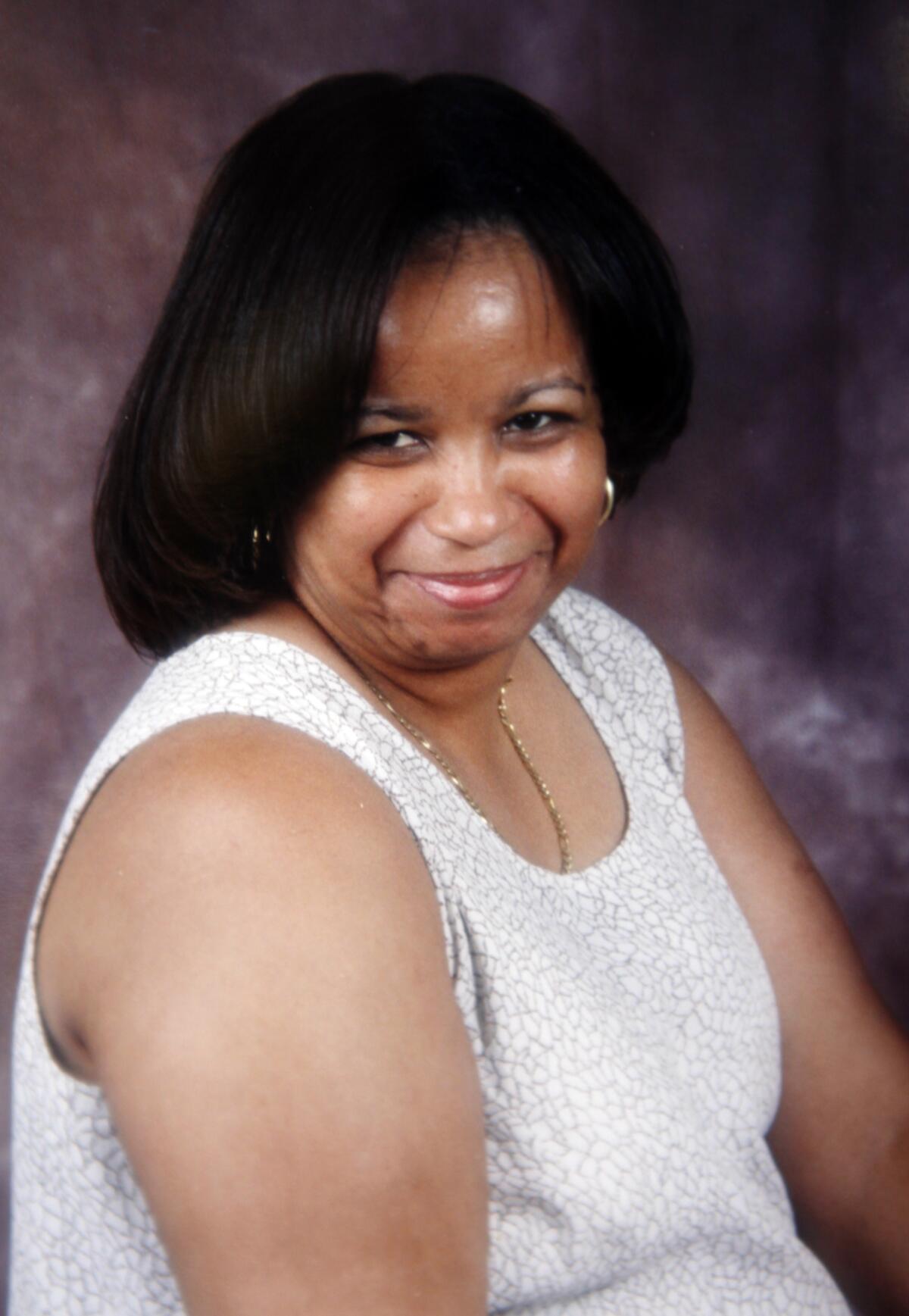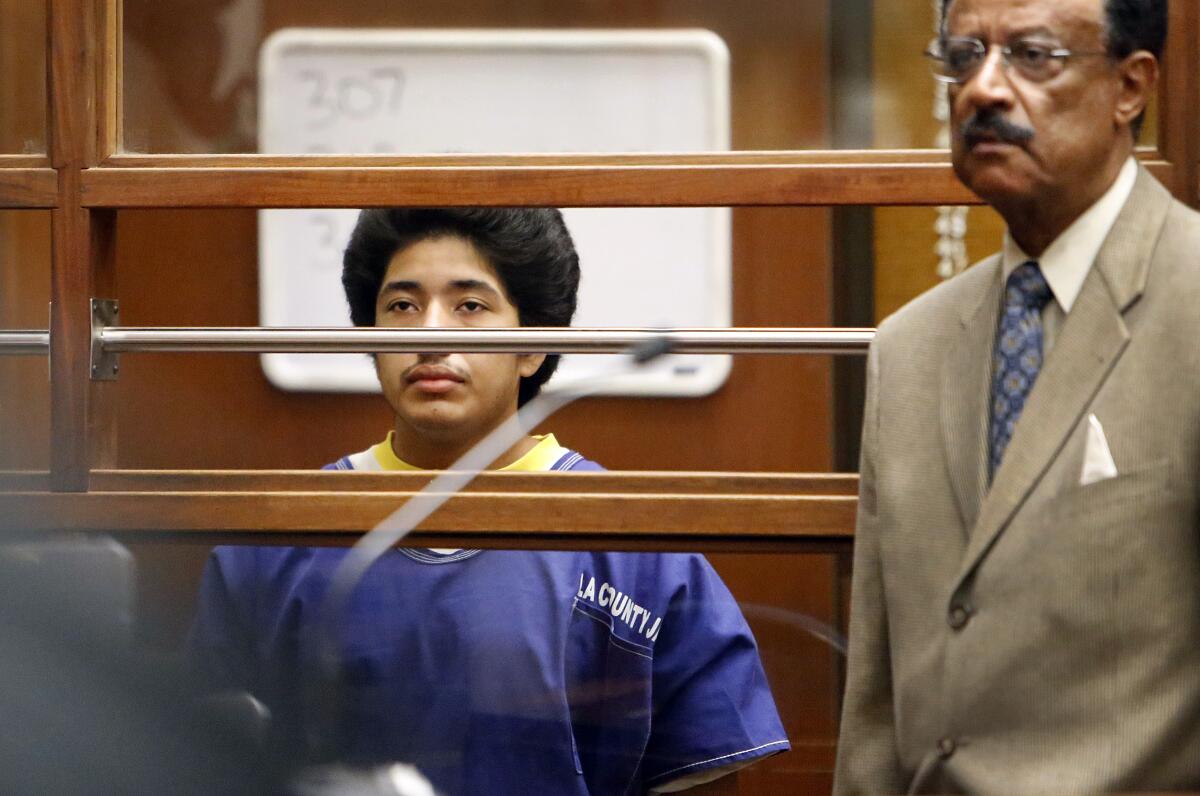Accomplices in two high-profile killings are freed under new California murder law

- Share via
When Keeairra Dashiell drove her boyfriend to a Los Angeles apartment building early one morning in 2007, she knew exactly why they were there, prosecutors said.
Tyquan Knox, the boyfriend, was dressed in all black, had his face covered and was armed with a gun. Inside, they believed, was Khristina Henry, who was days away from testifying against Knox in a robbery case. Their plan, said Deputy Dist. Atty. Danette Meyers, was straightforward: prevent Henry from testifying.
In the parking lot behind the building, the former Crenshaw High School football star didn’t encounter Henry but instead found her mother, Pamela Lark. He shot the woman five times, leaving her to die in front of her grandchildren.
At the time, the discrepancy between Knox’s intended target and his victim was irrelevant. Both Knox and Dashiell were charged with murder. Knox was convicted and Dashiell pleaded guilty.
But it was a key factor in a judge’s decision this week to free Dashiell from prison.
L.A. County Superior Court Judge Michael E. Pastor ruled Tuesday that Dashiell’s life sentence should be reduced to the 12 years she already served behind bars because of changes to California’s law on murder.
Before the changes took effect in 2019, if someone died during the commission of a felony a defendant could be charged with murder even if the defendant didn’t intend to kill the victim or didn’t know someone had been killed, or if the killing happened by accident.
The sweeping law allowed accomplices who were not involved in the killing and had no intent to kill to be charged with murder. The new rules are more restrictive, generally requiring that a person be a “major participant” in a killing that occurs during a felony or an accomplice who helps facilitate the killing to be charged with murder.
Because Dashiell had plotted with Knox to kill Henry, not Lark, Pastor concluded that she could not be charged with murder if the killing happened today and should be resentenced. With attempted robbery now the only viable charge, because Knox had demanded the woman’s purse, Pastor sentenced Dashiell to time served.
After pleading guilty to second-degree murder and attempted robbery in 2013, Dashiell was sentenced to 15 years to life in prison for murder and an additional four years in prison on the robbery charge and a gun enhancement. The earliest she would have been eligible for parole was 2025, Meyers said.
California’s previous felony murder rule drew widespread criticism for being overly broad and unfair as prosecutors throughout the state won murder convictions against people who played roles in crimes that ended in fatalities.
But as Lark’s family listened to Pastor tell them Tuesday that Dashiell would be set free because Knox killed one relative instead of another, they dismissed the new law as “unjust.”
“Since they mistakenly killed Pamela … that just nullifies everything?” Lark’s sister, Karen Slider, asked in court Tuesday. “She is just as guilty as the man who pulled the trigger.”
Knox was convicted of murder and sentenced to life in prison in 2011. Meyers, too, expressed dismay at the decision.
“I know the law has changed, but it has not changed to the extent that she’s not guilty of what she pleaded guilty to,” she said during the hearing.
During an emotional, nearly three-hour hearing, Pastor acknowledged he had been constrained somewhat by a state appeals court that found the new law probably applied to Dashiell and that her attempts to be considered for release had been improperly dismissed.

Dashiell was the second defendant this week to be released from prison in a high-profile L.A. murder case under the new law. On Monday, Jonathan Del Carmen was also resentenced to time served for his role in the 2014 robbery and beating death of a USC graduate student.
Del Carmen was one of four people involved in the attack on Xinran Ji, a Chinese student prosecutors alleged was targeted by the group in part because of his ethnicity. He was beaten to death with a bat.
Like Dashiell, Del Carmen pleaded guilty to second-degree murder and was sentenced to 15 years to life in prison. But Del Carmen acted only as the getaway driver and refused to participate when the same group tried to carry out another violent robbery later that night, said Deputy Dist. Atty. John McKinney.
“The evidence tended to show that, though he fully expected there to be a robbery, he did not expect the level of violence that ensued. Under the old law, he was culpable,” McKinney said. “Under the new law … he falls outside of that scope.”
The cases underscore the move in recent years by California voters and lawmakers toward reforms to the justice system that have reduced the state’s prison population, the use of cash bail and sentencing enhancements. Though advocates for criminal justice reform have said the changes are necessary to undo decades of discriminatory and unfair practices, they have left some crime victims feeling abandoned and victimized anew.
In court Tuesday, Meyers said Lark’s family has been failed at every level: by the Los Angeles Police Department in its failure to protect Henry and her family after she received threats over her plan to testify against Knox; by prosecutors who didn’t seek to revoke Knox’s bail in light of the threats; and most recently by the state Legislature, whose amendment to the felony murder rule Meyers described as “insane.”
Lark’s murder was the subject of a two-part series The Times published in 2009.
Dashiell apologized for her actions during a brief statement in court, but Henry expressed worry that the woman’s release might leave her looking over her shoulder again, like she was 15 years ago.
“I’m concerned in a sense. When she did all this, she had a future, her whole life ahead of her,” Henry said. “Now she doesn’t have anything to lose.”
More to Read
Sign up for Essential California
The most important California stories and recommendations in your inbox every morning.
You may occasionally receive promotional content from the Los Angeles Times.











